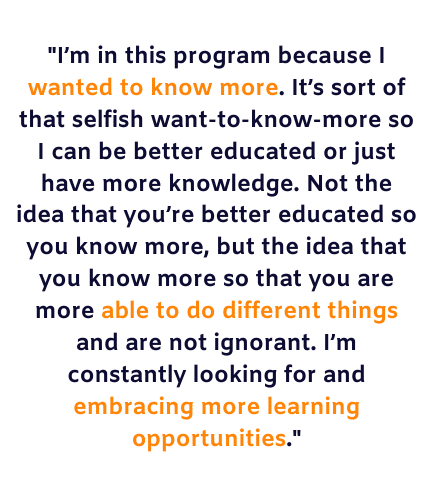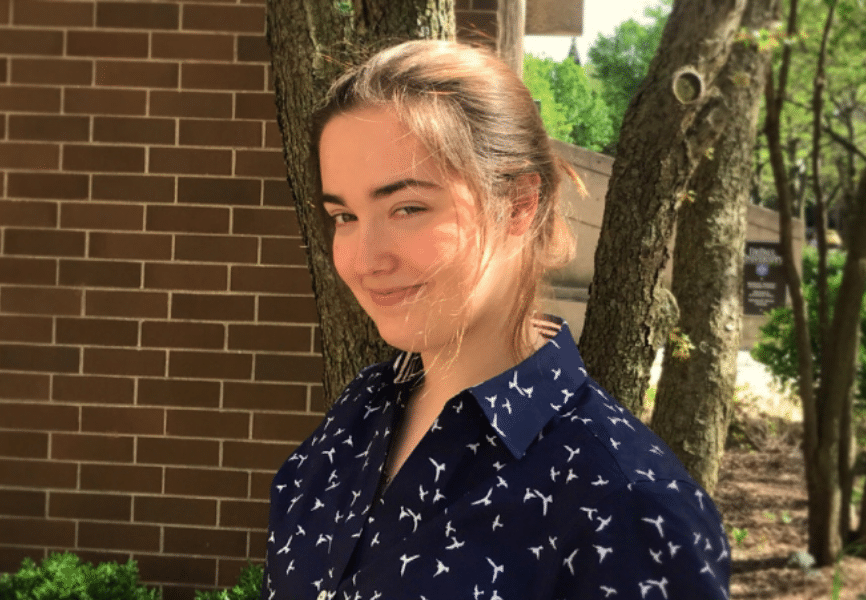Kate Fabsik is a BA-MA WRD student who has just made the transition into full-time graduate classes for this quarter, moving away from undergraduate courses. Starting Autumn 2020, she will continue working in the Writing Center but as a Graduate Assistant. With an interest in linguistics and the communication situations of language, Kate has always pursued opportunities where she can work with and experience the boundaries of culture and identity. We’ve given her the time to talk about her history with linguistics and how she has navigated her experience with WRD.
Tell us a bit about yourself. I understand that you’ve been to school in Europe.
For senior year of high school (2015-16), I went to the Czech Republic where I lived with three different host families in the span of a year and attended Czech high school. It was less of an academic pursuit and more of a cultural awareness, knowledge, and language acquisition. I got used to speaking Czech a lot of the time, used to other cultures, to the different lived experiences of other people. Especially in the class I’m in now ( WRD 507 Global Englishes), you can read about a lot of things about other cultures—and I’m not saying that’s not valid—but actually experiencing it is something else.

What I’m reading for Global Englishes actually reflects this. I’m reading Canagarajah for the course, which is about trans-lingualism—the whole idea of people just using whatever’s available to them when communicating. As someone who’s been around many international students before—at the same time—from many different countries trying to talk to one another, you hear it happen all the time. For instance, there’d be a group of say four Brazilians, one Mexican, and me, an American who only spoke some Spanish, but I could still understand what was going on. There is a way of pushing through and using the lingual assets around you to communicate with others who do not share the same language.
As you can tell, I have a strong passion for linguistics. I took Spanish for three years, and I’m still pretty proficient at that—more speaking rather than writing. In exchange, I did a year of Czech, but with that I got less formal instruction and more lived experiences. I actually got to the same comfortability level. Then, I took two years of Russian to here at DePaul, which is really related to Czech, so the grammar was super easy. I think once you learn one language, another thing you learn is the way you need to learn.
What would you say have been the most significant classes to you? What classes do you feel spoke to you and helped form your ideas on writing?
WRD 307 Rhetorical Traditions was really good. By the time I took it, it was this last year, and I had taken most of my WRD classes, but it felt like a good foundational class for ways to approach rhetoric. It was rather formative. I’m very particular to all of Jason Schneider’s classes. Almost all of his classes are related to different Englishes or language and linguistics, WRD 264 Language, Self, & Society being a stand out one. In that class, we examined linguistic rhetorics and the ways that people spoke. For example, at one point in the class you had to write about your own Englishes and things like that. As someone who doesn’t speak another variety of English, I wrote more about how my roommate and I have invented words to talk about our cat. We have all of these diminutive names like “Patches,” and when we see her we’ll give her the nickname “Porkchop,” that being another rhetorical reference for her.

Also out of Jason’s classes is English as a Second Language in Chicago. For that one, we partnered with the local nonprofit Chicago Mutual Aid Association and had to spend 25 hours during the quarter volunteering. I actually continued volunteering after the class ended. You go there and you basically tutor students who have varying backgrounds in proficiencies in English, letting you see the ways different people learn English differently.
Amidst COVID-19, a lot of WRD students have had to adapt and shift gears. How heavily has it affected you this quarter?
For this quarter, I shifted from undergrad to grad, so both of my classes have not had weekly synchronous meetings. It’s all been more infrequent. I miss being in a classroom. I miss being able to get that direct feedback when talking about a book. I miss the debate, the sense of schedule that going out necessitates, and much more. Otherwise though, I’ve been dealing okay with it. I still have my job at the Writing Center, which I feel very lucky to say thanks to our shift to remote consultations.
Half of our appointments were already online, so we had the infrastructure to completely adapt to the situation. We just didn’t have any procedures. I knew as soon as COVID was starting to happen and as soon as the provost was starting to have conversations with the Writing Center that they were already preparing. Our staff was already working to make sure that the next day’s appointments could still happen. We’re still operating to the same full capacity; all the staff are still here with no major changes.We used to have in person professional development project, but at the moment it’s all online and so it’s just finding that balance. So, how heavily has it affected me this quarter? It’s affected me a lot, but I’m negotiating.
What are your plans following graduate school?
At the moment, I have no plans for PhD and not really for teaching. I think I’ve focused more into the professional writing emphasis because I’m more interested in that. I’m open to all possibilities. Like I tell people, I don’t have a specific job out there. It’s more like, “Oh, there are these opportunities. What’s open? What do I think I could do?” I want to be able to adapt to the market and not get trapped into looking for something super-specific, which is how I’ve tried to handle my education. I’m in this program because I wanted to know more. It’s sort of that selfish want-to-know-more so I can be better educated or just have more knowledgeable. Not the idea that you’re better educated so you know more, but the idea that you know more so that you are more able to do different things and are not ignorant. I’m constantly looking for and embracing more learning opportunities.
